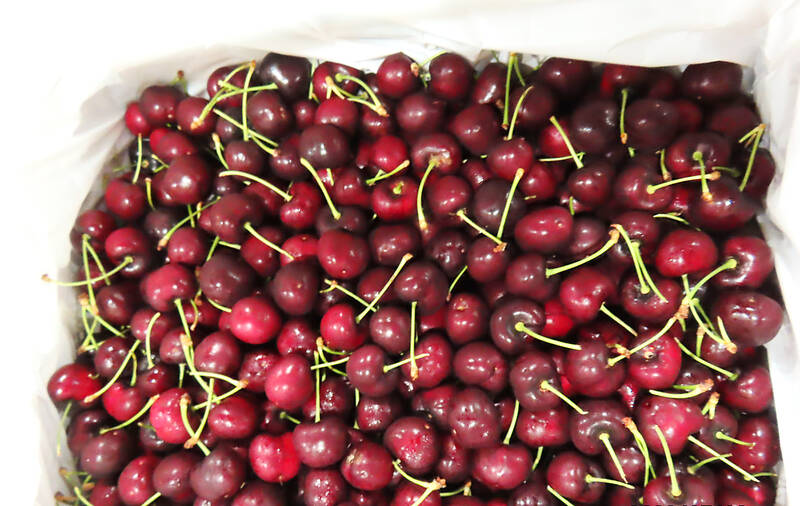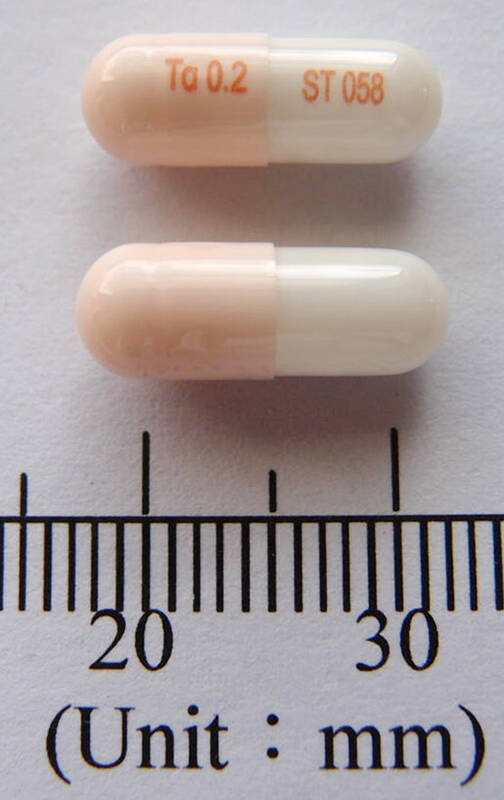The Food and Drug Administration (FDA) yesterday released a list of 14 items that failed border inspections, including 18 batches of cherries from the US that failed border inspections in the past six months.
The 14 items included cherries from the US and Canada, truffles from Italy, chanterelle mushrooms from France, honeydew melon from Japan, cumin from China, black sesame from China, cookies from Vietnam, cardamom from India, banana paste from the Philippines and training chopsticks from China.
They failed the inspections for having excessive residue levels of pesticides, heavy metals, radioactive substances or acetic acid, and they have been returned or disposed of, the FDA said.

Photo copied by Wu Liang-yi, Taipei Times
Five items were fresh cherries — four from the US and one from Canada, the FDA said, adding that the four batches (a total of 14,160kg) from the US were found to have excessive residues of the fungicide mefentrifluconazole, while the batch (250kg) from Canada was found to have residues of the insecticide cyclaniliprole, which is banned in Taiwan.
FDA Deputy Director Lin Chin-fu (林金富) said that a total of 18 batches of cherries imported from the US have failed the border inspection for excessive mefentrifluconazole residue and therefore the sampling rate has been tightened to 100 percent.
Mefentrifluconazole can only be used on cucumbers and as Taiwan does not grow cherries, there is no maximum residue limit set for it on cherries, so if the residue concentration exceeds the limit of detection — 0.01 parts per million or more — it would fail the inspection, Lin said.

Photo courtesy of the Food and Drug Administration
Lin said the FDA has informed the American Institute in Taiwan about the situation, and recommended that it submit information and apply for a maximum residue limit for mefentrifluconazole on imported cherries so that the government could draft new regulations.
As a batch of Canadian cherries imported last year by the same importer had failed an inspection, the sampling rate was increased, he said, adding that it would be further tightened to batch-by-batch inspections until five consecutive batches pass the inspection.
Meanwhile, the FDA also issued a recall on a drug used to treat benign prostatic hyperplasia — 0.2mg Holigin S.R. Capsules manufactured by Taiwan Biotech Co Ltd (信東生技) — whose main active ingredient is tamsulosin hydrochloride.
FDA Deputy Director Chen Hwei-fang (陳惠芳) said 12 batches, about 1.7 million capsules, are being recalled as the drug has a two-year expiration date, but the company’s stability testing in the 18th month found that the dissolution performance had dropped to nearly the lowest specification limit, implying that its therapeutic effectiveness would fall below the specification before the expiration date.
The FDA said it has asked the drug company to finish recalling the drug by Aug. 24, and it also informed healthcare facilities and pharmacies to stop prescribing the drug from the 12 batches and assist in recalling the drug.
If people have concerns about the drugs they are taking they are advised to consult a doctor, it said.

Beijing could eventually see a full amphibious invasion of Taiwan as the only "prudent" way to bring about unification, the US Department of Defense said in a newly released annual report to Congress. The Pentagon's "Annual Report to Congress: Military and Security Developments Involving the People's Republic of China 2025," was in many ways similar to last year’s report but reorganized the analysis of the options China has to take over Taiwan. Generally, according to the report, Chinese leaders view the People's Liberation Army's (PLA) capabilities for a Taiwan campaign as improving, but they remain uncertain about its readiness to successfully seize

Taiwan is getting a day off on Christmas for the first time in 25 years. The change comes after opposition parties passed a law earlier this year to add or restore five public holidays, including Constitution Day, which falls on today, Dec. 25. The day marks the 1947 adoption of the constitution of the Republic of China, as the government in Taipei is formally known. Back then the Chinese Nationalist Party (KMT) governed China from Nanjing. When the KMT, now an opposition party in Taiwan, passed the legislation on holidays, it said that they would help “commemorate the history of national development.” That

Taiwan has overtaken South Korea this year in per capita income for the first time in 23 years, IMF data showed. Per capita income is a nation’s GDP divided by the total population, used to compare average wealth levels across countries. Taiwan also beat Japan this year on per capita income, after surpassing it for the first time last year, US magazine Newsweek reported yesterday. Across Asia, Taiwan ranked fourth for per capita income at US$37,827 this year due to sustained economic growth, the report said. In the top three spots were Singapore, Macau and Hong Kong, it said. South

Snow fell on Yushan (Jade Mountain, 玉山) yesterday morning as a continental cold air mass sent temperatures below freezing on Taiwan’s tallest peak, the Central Weather Administration (CWA) said. Snowflakes were seen on Yushan’s north peak from 6:28am to 6:38am, but they did not fully cover the ground and no accumulation was recorded, the CWA said. As of 7:42am, the lowest temperature recorded across Taiwan was minus-5.5°C at Yushan’s Fengkou observatory and minus-4.7°C at the Yushan observatory, CWA data showed. On Hehuanshan (合歡山) in Nantou County, a low of 1.3°C was recorded at 6:39pm, when ice pellets fell at Songsyue Lodge (松雪樓), a